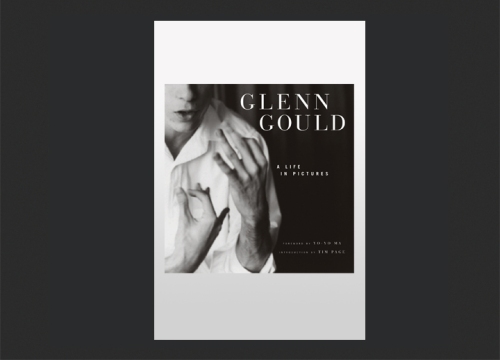On Tim Page, Glenn Gould: A Life in Pictures
This is a book in celebration of what would have been GG’s 70th birthday; it’s a short book, consisting overwhelmingly of photos of the eccentric, the genius all the time, the night-owl who worked till dawn, the despiser of concerts and touring, the glutton of weak tea, the telephoner sans pareil especially at odd early morning hours, the relationship control freak, the one whose Bach keyboard work on 10 CDs brought me out of the dark space of Mahler mourning that I had immersed myself in after the death of Mev.
Here is an example of a perfect sentence by Gould fan Tim Page: “No matter how one chose to define that extra, ur-Gouldian dimension—as expressive urgency, brainy intensity, spiritual seeking, nervous energy or some combination of all these and more—it was ever present in his best performances, which could have been by no other artist.” [14] And this one: “He was witty, kindly, energetic and intensely interested, and extended an instant camaraderie to anybody whose company, telephonic or otherwise, he enjoyed.” [37]
And why not simply appreciate Gould in all of his complexity: “He was an individualist who prized rectitude and puritanical moral values, yet he considered himself a socialist and was skeptical of religious dogma.” [16] Further, Page notes some of Gould’s characteristics: “profound self-direction, a photographic memory, a marked preference for unbroken routines, extreme discomfort in most social situations, a penchant for isolation, inflexible obstinacy on certain mattes and a generalized, irremediable anxiety that often bordered on panic.” [40] I am amazed at such feats of memory, as when GG was 12, he could play the first book of WTC by memory. Tureck could do the same but not quite so young, I think.
The book offers some respectful reflections from others on Gould:
Leonard Bernstein: I worshipped the way he played. I admired his intellectual approach … his complete dedication to whatever he was doing, his constant inquiry into a new angle or a new possibility of the truth of the score.
Yoyo Ma: While we are bereft of Gould’s inimitable artistry, the legacy of his imagination is a gift we will continue to treasure for many years to come. 13
Peter Elyakim Taussig: Suddenly you get a sound that no one has ever heard before … it’s boney, it’s taut…it’s very rhythmical, it’s clean, it’s transparent. Here is a skinny scrawny guy from Canada who looks as if he’s about to die by the time he comes on stage—so pale…he sits almost on the floor, he sings while he is playing. We’ve never [heard] anything like this. It’s like, ‘Where did this guy come from?’” [79]
Kevin Bazzana: The most basic premise of Gould’s aesthetic was that music is primarily mental and only secondarily physical….For Gould a musical work was an abstract entity that could be fully comprehended in the mind in the absence of a performer, without even the recollection of sounds or of physical means of production. [147]
Bruno Monsaingeon: [GG] resisted the falsely satisfying temptations of the world: public opinion did not reach him; he did not seek approval…Indeed he thought the artist should be granted anonymity. In this quest, he was reaching back to the status of the Medieval illuminators and cathedral builders who served a purpose larger than themselves. [169]
Then, of course, there are some Gouldisms worth meditating on:
For every hour you spend in the company of other human beings you need X number of hours alone … isolation is the indispensable component of human happiness.
Technology has the capability to create a climate of anonymity and to allow the artist the time and freedom to prepare his conception of a work to the best of his ability. It has the capability of replacing those awful and degrading and humanly damaging uncertainties which the concert brings with it. [29]
The Goldberg Variations is music which observes neither end nor beginning, music with neither real climax nor real resolution….It has, then, unity through intuitive perception, unity born of craft and scrutiny, mellowed by mastery achieved, and revealed to us here, as so rarely in art, in the vision of subconscious design exulting upon a pinnacle of potency. [80]
For Bach, the contrapuntal style…was a way in which to define musically the life of the spirit, and that for him, a texture which brought together and unified many diverse elements was best of all able to glorify God.
The great thing about the music of Sebastian Bach is that it transcends all of the dogmatic adherences of art… all of the frivolous effete preoccupations of aesthetics. It presents to us an example of a man who makes richer his own time by not being of it….It is an ultimate argument… that man can create his own synthesis of time without being bound by the conformities time imposes. [131]
The purpose of art is not the release of a momentary ejection of adrenaline but rather the gradual, lifelong construction of a state of wonder and serenity. [41]
I have 50+ hours of his recorded music, and I can say that I will spend the rest of my life, however long that will be, studying Bach and Gould. Here’s a terse exchange that says it all: “But, Glenn, if we are ‘New’ Music Associates, why are we doing a Bach concert?” “Bach is ever new,” came the reply. [22]
Coming up: listen to Gould and then consider William Kapell’s recoding of Bach’s Partita #4, which Page describes as Gouldian “in its clarity, brilliance, and fierce linear concentration.” [24] (Still, I wonder what did Tureck think of GG’s Bach? Or Landowska? More to listen to in the near future: Beethoven concerto: #2, Wanda Landowska, Rosalyn Tureck, Edwin Fischer, Bach’s Concerto in D minor, Brahms Piano Concerto No. 1, Berg, Hindemith, Rubenstein’s Brahms Piano Quintet, Richard Strauss “the greatest composer of the 20th century,” & Schoenberg’s Ode to Napoleon.
